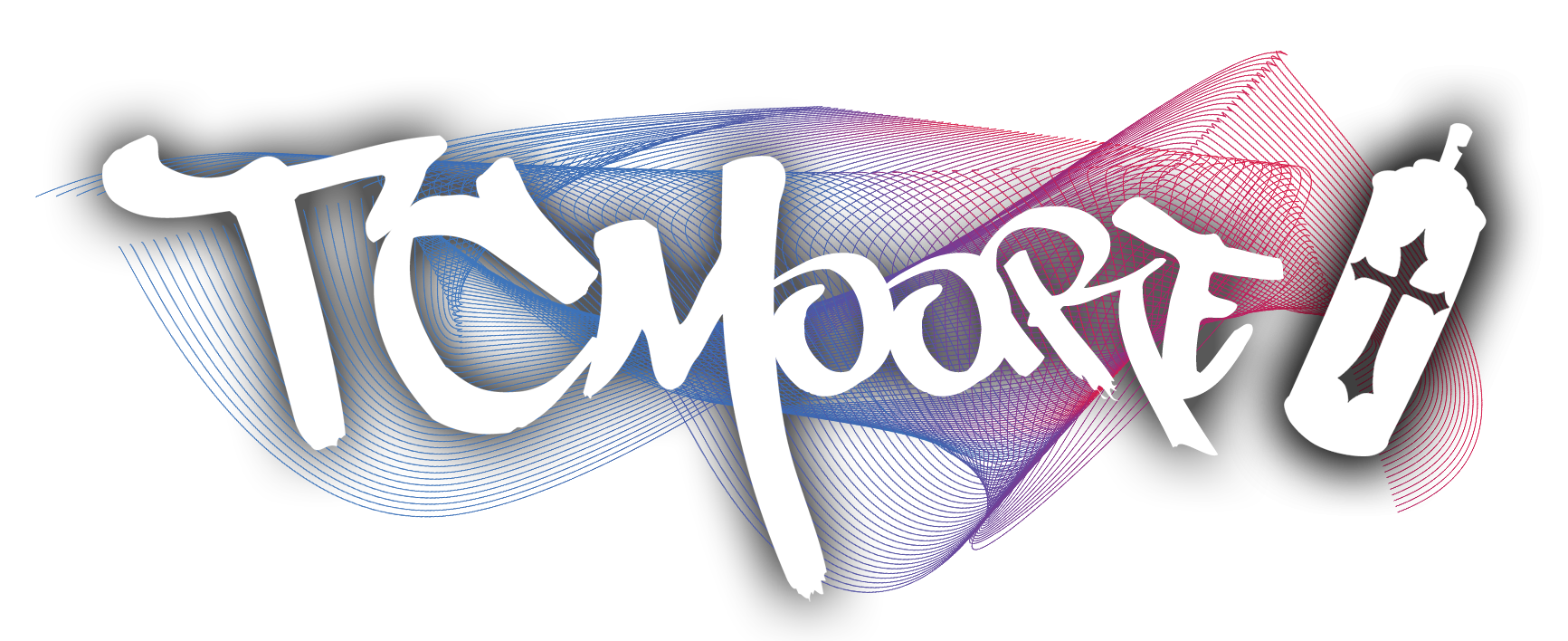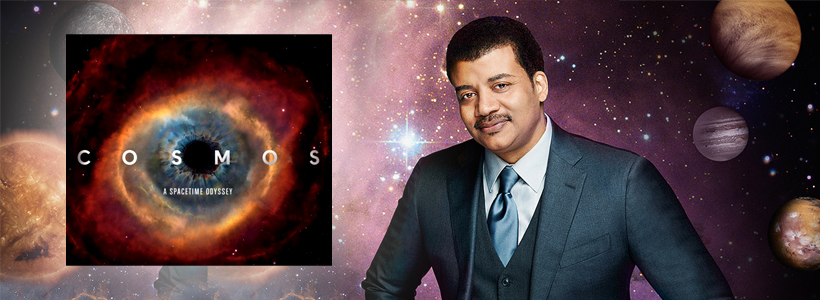As I've publicly stated in the past, Neil deGrasse Tyson is one of my favorite people on the planet [1]. He has a compelling personality; he's a brilliant thinker; and he has an inspiring story. When he has appeared on The Daily Show (btw, Jon Stewart is another one of my favorite people on the planet), I've watched with a generous portion of fanboy enthusiasm. I love it when he corrects the inaccurate science of movies and TV shows without apology or subtlety [2]. I'm like that when it comes to theology. If I come on your show and you've got Jesus hanging on the wall depicted as a European, better believe I'm going to tell you about yourself!
For all these reasons and more, I was very excited when I find out Tyson had been chosen to host a reboot of the classic TV show: Cosmos. And I watched the first episode with 'nerdy glee'. [3]
While the episode's visual effects were stunning (including an very cool, updated version of the "Cosmic Calendar" from the original show), and while I will continue to watch the series to see what develops, I have to unfortunately report that I was very disappointed with what I can only call the episode's religious approach to science and its unscientific approach to history.
People Are Biased, Especially Smart People
It's important that we never place those we admire on so tall of a pedestal that they would dare not climb it because to fall is certain death. [4] Neil deGrasse Tyson, like every other human ever born, is biased. His experiences from his subjective perspective have helped to shape his convictions, conclusions, and (yes) his "beliefs." There's actually no getting around this, for any of us.
Few things are less aggravating for me, yet more common, than reading or hearing educated people claim objectivity. Education should lead a person to the unavoidable conclusion that as one grows in their capacity to critically analyze life, they are arriving a increasingly more conclusions, not less. PhDs, for example, have become experts in a very narrow area of subject matter. Their education has honed their focus to a fine point. On that point, they have poured over the research and writing of countless others. On that point, they have developed countless theses and developed their thinking over the course of years, but more likely decades. To expect that expert to be "objective" is ridiculous. There are no persons more likely to have a biased opinion than the highly educated, because bias that results from legitimate information, training, and experience is bias nonetheless.
A Religious Approach to Science and an Unscientific Approach to History
Tyson has legitimate reasons to be biased—he's both highly educated and highly intelligent. But Tyson's legitimately-informed opinions are often falsely presented as objectivity. That's disappointing. Absolutist metaphysical claims should be confined to the domain of Fundamentalist Religionists, not reasonable, scientific people. But Tyson begins Cosmos with an homage to the original show, a mantra Peter Hess called something more akin to a "paean of praise from the Christian liturgy" than a statement of scientific fact. [5] Quoting Sagan, Tyson said, "The cosmos is all that is or ever was or ever will be." It's true that the cosmos is all we
Currently Know exists,
When interpreted from a Atheistic Materialist worldview. But science is not equipped to determine what will or won't be discovered in the future (e.g. "…or ever will be"), and science is not equipped to pronounce Atheistic Materialism the only game in town. As Hess points out,
"Consciously or unconsciously, all of us—Christian or Muslim, monotheist or atheist, freethinker or agnostic—carry the baggage of metaphysical beliefs in our approaches to science. If we are honest, we will explicitly acknowledge our metaphysical carry-on, recognizing that the story of this pulsing, vibrating, magnificently unfolding universe is susceptible of both theistic and atheistic interpretations." [6]
But Cosmos's religion-like approach to science did not end with absolutist metaphysical claims; it also continued with a witch trial and a conversion testimony.
A Witch Hunt and a Martyr
Not ones to shy away from irony [7], the New Atheism [8] has been attempting to burn religion at the stake for over a decade now. And one of their most common weapons they brandish in their mob-like groupthink is the "Religion is Anti-Science" trope. I had hopes that Cosmos would not be as simple-minded as such anti-theists, but I was unfortunately let down.
Midway through the first episode, the entire presentation shifted from computer-generated, awe-inspiring vistas of the universe to a jagged, cartoon history lesson. A person might wonder what purpose such a divergent storyline has to do with the cosmos. The answer lies in the narrative Cosmos is attempting to construct with regard to the development of modern science in contrast to religion. Using the obscure story of Giordano Bruno, a possibly unhinged friar (that means he was a highly religious person) who believed in multiple "worlds" in the universe and was executed for heresy, Cosmos attempts to tell the story of the medieval Roman Catholic church's opposition to science. The problem is, the actual historical facts do not support the narrative Cosmos attempts to construct.
In contrast to Cosmos's narrative, Bruno was not executed for this cosmological theories. He was, in fact, executed for his heretical
theological views—views on the the divine nature of the Christian Messiah, the triune nature of the Godhead, and a host of other subjects on which Cosmos had no comment. [9] Far from being the martyr for science that Cosmos attempted to cast Bruno as, it is far more likely Bruno was no martyr at all. For martyrdom necessitates that a person has died in *defense* of the truth about Christ, not opposing it.
It's unfortunate that modern and postmodern viewers will likely never investigate beyond the narrative with which they were presented by Cosmos. The mere offense of capital punishment enforced by a state in which the religious and civil spheres were inexorably enmeshed is enough to indict all religious people in popular opinion. Therefore, Cosmos there is little hope Cosmos would ever face any backlash or consequences for such a mischaracterization of religion. But what should strike the general viewing public as utterly inconsistent, if not hypocritical, is the overtly religious manner in which Cosmos set about telling the story of science's development in the West.
First, Cosmos chose the story of a singular figure who was supposedly persecuted through no fault of his own by the faceless machine of religion—a person who's only aim was to advance human understanding through science. However, none of that is scientifically substantiated. Under even mediocre scrutiny, one can observe that these "facts" do not hold up. Bruno was a religious person (a friar) who did not use the scientific method to observe, document, and test his hypotheses. No, he claimed to have knowledge of other "worlds" from
a vision God gave him in which he traveled to them. Furthermore, Bruno was not punished for cosmological claims, but for claims wholly unrelated to them. Further still, Bruno was punished not by the church, but by an unholy union of church and state. But none of Cosmos's rhetoric reflected any animosity toward the power of governments to suppress knowledge or science. God knows that doesn't happen in the U.S.,
right!?
Second, by using an intentionally emotional appeal to audiences, in the form of a martyr story, Cosmos deliberately employed the means by which religious convictions are inspired. Thereby, Cosmos utilized the means of the religious by whom they are attempting to depict science as persecuted. One might be tempted to think that a program as committed to the scientific method as Cosmos claims to be would take a more scientific approach to historical reconstruction. That one would be wrong. Rather than gathering the best historical resources and presenting a composite with critical input from expert sources, Cosmos instead presented both a literal and metaphorical cartoon of Bruno's story.
Good Old-Fashioned 'Personal Testimony'
Another amazing way Cosmos employed religious means to convey their message about science was through the use of Neil deGrasse Tyson's personal story, which includes his relationship with Carl Sagan.
At the end of the first episode of Cosmos, Tyson related the tear-jerking and heart-warming story of how he, a young kid from the Bronx (an under-resourced borough of New York City) with dreams of becoming an astronomer, met Carl Sagan and how powerful and lasting was the impact of that meeting. Tyson even produces artifacts from that encounter not at all unlike medieval monasteries that housed the bones of saints, or televangelists who sell prayer clothes for the healing of their TV viewership. The reverence Tyson showed for the mementos he preserved from Sagan's life was nothing short of religious. For him, the signed book by Sagan that Tyson keeps to this day is no less sacred than the Bible given to me by a Christian minister for Christmas following my conversion to Christianity as a teenager. In fact, Tyson goes on to state in no uncertain terms, Sagan's influence on his life was far from merely professional. No, Sagan showed him "what kind of person he wanted to be." Ethics and morals are decidedly not the realm of science for the Atheistic Materialist. For the Atheistic Materialist, Sagan was merely honoring some sort of social contract out of an evolutionary impulse to perpetuate the species. Tyson has groped around in the dark absence of a spiritual framework—out of a manufactured fear of "religion"—and has stumbled upon, and embraced, his own brand of religion:
Saganism.
Conclusion
Perhaps the Cosmos series cannot be faulted for employing religious means to convey a message about which they feel passionately. For millennia, religious methodology like these have been effectively used to gain followers for a belief-system. But Cosmos cannot employ a religious approach to science and an unscientific approach to history without rendering itself grotesquely hypocritical. With the New Atheists, the series seeks to present science as the foundation of all that can be known, and the only proper methodology for discovering facts. All the while, however, the show itself employs religious themes, means, and messages to teach against religion. That is a contradiction that ironically demonstrates a lack of faith in science.
The reality is faith and science are
not enemies! As Hess points out, "Missing were the stories of Catholic astronomers such as Copernicus and Galileo, Protestants such as Brahe and Kepler and Newton, or Fr. George Lemaître, proposer of the Big Bang." [10] One of my personal heroes of theology is also a world-renowned physicist: John Polkinghorne. [11] He would certainly not say that science and faith are enemies, but would most certainly say they are complementary. Also, there is a whole host of noteworthy theologians and Christian church leaders who also affirm science and see no irreconcilable conflict between the two. One particularly clear space where these two worlds are both celebrated is in the BioLogos community. [12]
I'd like to see Cosmos take a more scientific approach to the relationship between science and faith. If they did, they would discover that people of faith (religious people) have been vitally responsible for the development and advancement of science, and many modern scientists are people of faith.
____________________________________________
1. [
https://www.facebook.com/revtcmoore/posts/10153768461315077]
2. [
http://www.wired.com/underwire/2013/10/neil-degrasse-tyson-gravity/]
3. Shout out to Joshua Tom for this phrase. I've gotten some good milage out of it.
4. This analogy is accredited to Ellen Hopkins in
Identical.
5. Peter Hess, "A Burning Obsession: Cosmos and its Metaphysical Baggage" [
http://ncse.com/blog/2014/03/burning-obsession-cosmos-its-metaphysical-baggage-0015452]
6. Ibid.
7. "After a schism, a question: Can atheist churches last?" [
http://religion.blogs.cnn.com/2014/01/04/after-a-schism-a-question-can-atheist-churches-last/]
8. "The New Atheists" [
http://www.iep.utm.edu/n-atheis/]
9. "Bruno was not condemned for his defense of the Copernican system of astronomy, nor for his doctrine of the plurality of inhabited worlds, but for his theological errors, among which were the following: that Christ was not God but merely an unusually skillful magician, that the Holy Ghost is the soul of the world, that the Devil will be saved, etc."[
http://en.wikisource.org/wiki/Catholic_Encyclopedia_(1913)/Giordano_Bruno]
10. Hess, "A Burning Obsession"
11. "The Compatibility Between Science and Religion" [
http://youtu.be/GTYrL827Gxg]
12. BioLogos [
http://BioLogos.org]


